| |
What do the 80th birthday celebration for Rosalie Sorrels, former Richmond Mayor David Pierce and Hunter S. Thompson (remember Fear and Loathing in Las Vegas?) have to do with Richmond, more particularly Point Richmond? This started out as simply a description of a short trip to Idaho but segued into a glimpse of a wild and crazy Point Richmond in the 1960s. Read on. You couldn’t make this stuff up.
We spent five days near Idaho City, Idaho, at the 80th birthday celebration for folksinger Rosalie Sorrels. Other Point Richmonders included Barbara (Rhodes)and Steve Friday, Charlotte Knox and Sybal Hallbauer.
Rosalie Sorrels played the Bay Area often in the mid-1960s and lived in Point Richmond part of that time. She has had a six-decade career performing with all the famous folksingers of the latter 20th Century. See http://www.sunvalleymag.com/Sun-Valley-Magazine/Summer-2013/Local-Buzz/index.php?cparticle=5&siarticle=4.
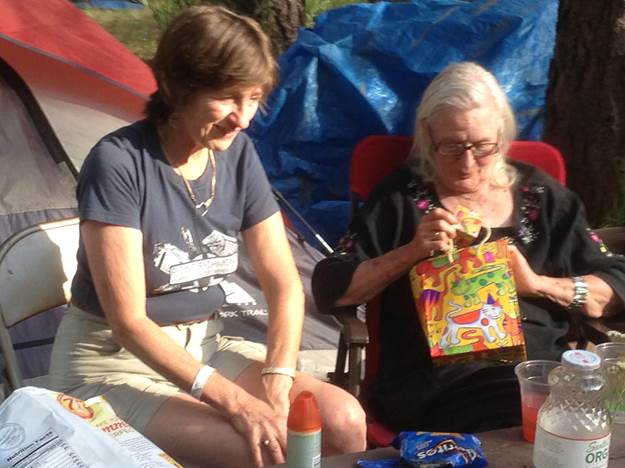
Shirley Butt with Rosalie Sorrels at Rosalie’s Grimes Creek home
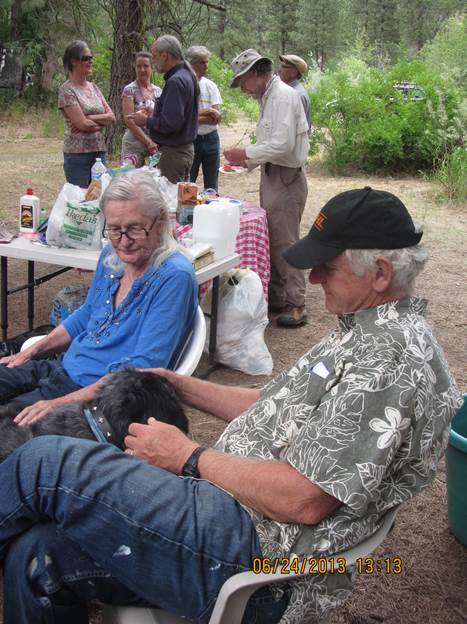
Above, Tom Butt and Rosalie
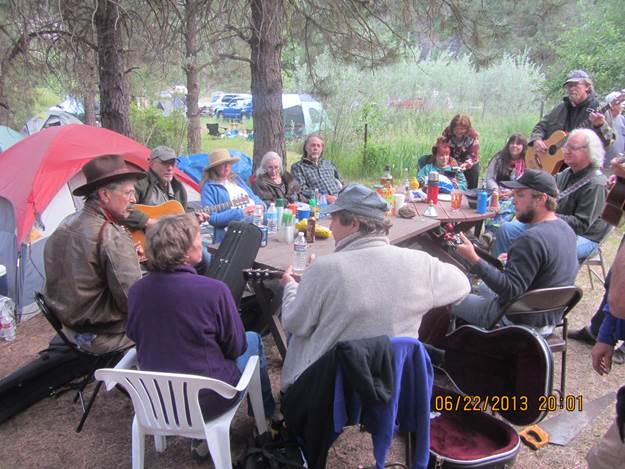
Jammin’ at Grimes Creek
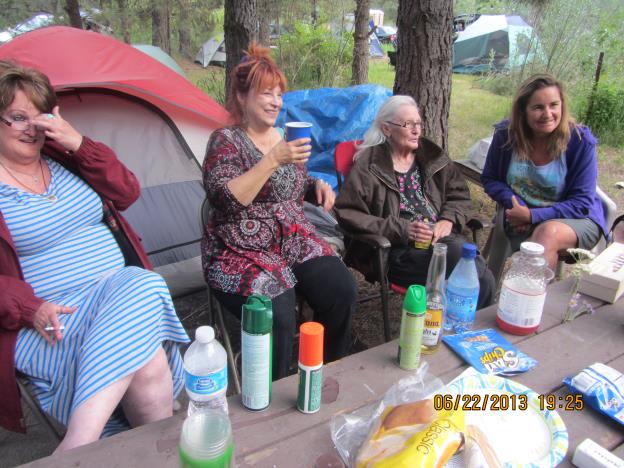
Rosalie’s daughter Leslie, Barbara Rhodes Friday, Rosalie Sorrels and Charlotte Knox
For example, in 1970, she played in the "Summer Festival for Peace - Benefit Concert" in Philadelphia with Big Brother and The Holding Company, Judy Collins, Al Kooper, Country Joe McDonald, Miles Davis, Delaney & Bonnie, John Denver, Richie Havens, Janis Joplin, Mother Earth, Tom Paxton, Peter Paul & Mary, The Rascals, Seatrain, David Rea, Rotary Connection, Sha Na Na, Staple Singers, Rosalie Sorrels and Ten Wheel Drive.
What brought us to Rosalie’s place on Grimes Creek near Idaho City is her Point Richmond connection that also provides a tantalizing window into the 1960s, when Point Richmond apparently was a magnet for both offbeat characters and blazing talent. It turns out that Rosalie hung out in Point Richmond with an unlikely and colorful group that included, among others, Richmond’s Mayor David Pierce, Jack Thibeau, a film star during the 1970s and 1980s, the famous author Hunter S. Thompson and assorted Hell’s Angels.
Long time Point resident Barbara Rhodes Friday has been a close friend of Rosalie since that era and was responsible for introducing us and making us fans.
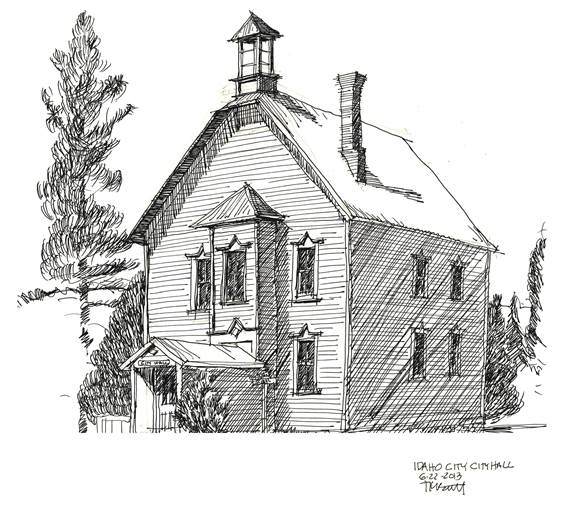
Above, City Hall of Idaho City, population 484
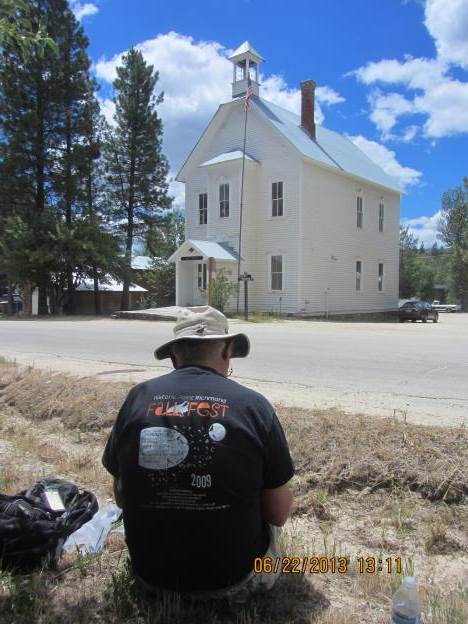
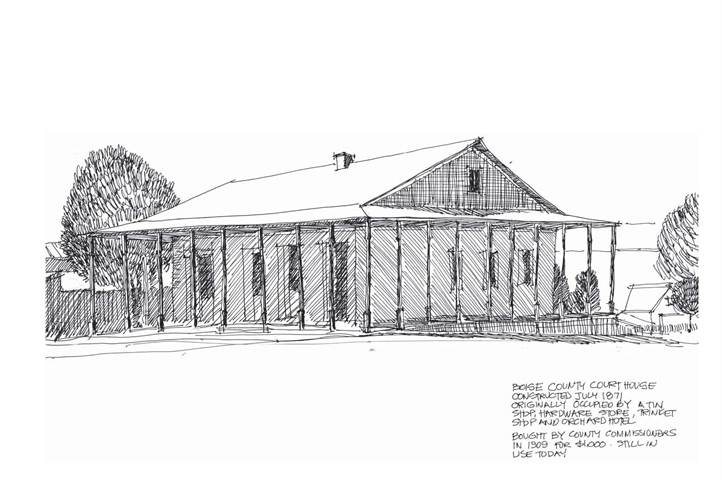
Above, Boise County Courthouse in Idaho City
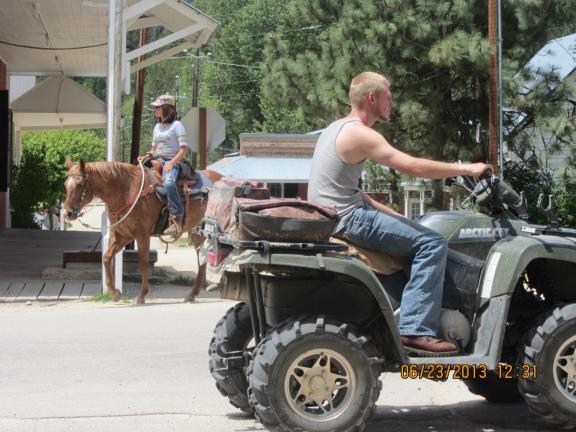
Above, another exciting day in Idaho City showing favored transportation modes
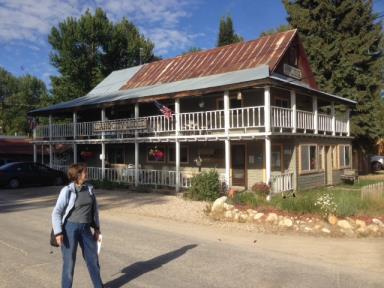
Above, our 5-star hotel in Idaho City
By all accounts, Point Richmond in the 1960s was a happening place. Let’s start with David Pierce.
David Pierce graduated from Richmond High in 1951 and attended Hastings College of the Law. At one time he was a law partner of Jack Knox. David was a brilliant lawyer, and the 1960s Richmond power broker Bert Coffey saw him as an up and coming potential politician and encouraged him to run for City Council.
Pierce was elected and ultimately rotated into the mayor’s seat. The best descriptions of Pierce in the 1960s come from his friend, Hunter S. Thompson. Apparently, Pierce decided not to make a career of politics and moved from the position of Mayor of Richmond to somewhere in Asia. Hunter S. Thompson writes:
I think David Pierce (the garbage mayor of Richmond) had the right idea, he is now living on a hashish farm in Nepal, financing his New Life with profits from various hypes and skullduggeries from the old days …I now understand why he panicked when I put you onto that garbage lobby deal.
I seem to run into Pierce somewhere every few years. In 2009, he lived in Bangkok and regaled us with tales of his pet baby elephant. The last time I saw him before the 2009 Fall Fest, he was stark naked on a gravel bar of the Eel River at the Kate Wolf Music Festival at Black Oak Ranch (also known as “The Hog Farm”) in Laytonville, CA.
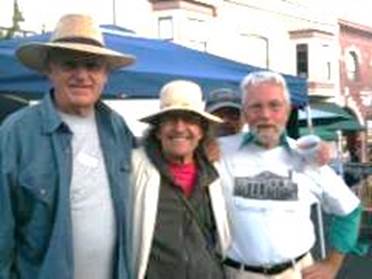
Above, Tom Butt, David Pierce and David Vincent at Point Richmond Fall Fest 2009
Jean Knox writes the following about David Pierce:
I’d like to add two items which speak to David Pierce’s enduring contributions to the city: If David had not been on the council (1966-7 would be the dates I believe) not only Point Richmond, but the whole city, might not be enjoying Keller’s Beach. The property at that time was held by Danny Keller, son, I believe, of a Santa Fe Railway engineer to whom it had been granted as a life estate as compensation for severe injuries in a rail accident. The Kellers had a beer shack at the end of a short pier which provided a living. I remember seeing a sign on the then very little beach: ”We reserve the right to refuse service to anyone.” Not a friendly spot for lots of people in Richmond, but it was a popular spot for the water ski boats which roared in the shallow cove. When Danny Keller died and Keller’s became city property, David realized there was no longer any excuse for the city to neglect waterfront recreation, and he put together the votes needed from the nine member council to create Keller’s beach. It wasn’t a slam dunk, as you’d now think it would have been, but that’s a longer story about Richmond politics, Tom, than you may want to insert here. Ted Osmundsen was the landscape architect who came up with the brilliant scheme which transformed the narrow driftwood cluttered site to the jewel it is today. (See pictures in the Richmond Historical Museum).
Another of David’s significant, and maybe even enduring, contributions was putting together city support (funding) for improving neglected street drainage on the south side, which routinely and sometimes disastrously flooded.
Given all the stories of David’s association with the flamboyant Hunter Thompson, I’d like to point out that his day time costume and persona was strictly Brooks Brothers. There was, however, the Mandrake cloak for transition to the Fillmore.
Somehow David Pierce and Hunter S. Thompson, of Gonzo Journalism fame, became friends and hung out together in Point Richmond. In “Meeting Hunter S. Thompson,” Margaret A. Harrell writes (http://www.poetspath.com/Scholarship_Project/harrell.htm):
Another old friend, David Pierce, played a key role in the Hell's Angels publication in stealth and required everyone involved be sworn to secrecy. To this day no one has revealed it. Desperately tracking down Pierce in 2008, I located him en route to Thailand—about to disappear. Fortunately, for Keep This Quiet! he withdrew the oath. Below is some background.
In the 1960s, Pierce, a good-looking, intelligent attorney, worked twelve hours a day and lived in a beautiful house with teak floors. In the heyday of hippies he was mayor of Richmond, in the Bay Area. He reminisces jovially.
"Here's a typical Hunter Thompson story. Hunter hung out at my house because there was a lot of drugs and booze and he was broke. He kept telling me I should go see the Hell's Angels. I had no desire to. I thought of them as being a bunch of really disgusting scamps. As usual, he had this sheepskin coat with this big tape recorder on his back. So I finally agreed and I put on an old dirty pair of Levi's and an old shirt and we go to Oakland [to a] scumbag pool hall."
Within minutes Pierce left. Hunter followed. "And again, as usual, he has a bottle of Wild Turkey right beside him in his old beat-up car." To make a long story short, Pierce, who handily and overwhelmingly carried the African-American vote, told him, "'Tonight's celebrity night in Richmond. This black club on the South Side would really like me to show up because I'm the mayor.'"
At the club, they "get completely smashed. They got transvestites dancing on the bar, the whole damn thing
They left at 2:00 a.m. Hunter was, as typically, parked right out front in the bus lane. Three policemen had the car surrounded. Though Pierce tried to make nice, Hunter liked the odds for a fight. Behind Hunter and Pierce was a sort of Greek chorus softly murmuring, "You're the mayor, asshole. What you kissing ass for? Those fuckers work for your ass." One cop, overhearing them, conveyed the news to the other two and charges were dropped. Insisting Hunter was drunk, the officers made the loaded mayor drive home followed by three cop cars.
Hunter had two large swords on his wall, and another time they sword fought in the street: "So ... we're whacking [said with the sound of wind in his voice] the swords back and forth and of course the neighbors call the cops." The cops asked for ID. Pierce showed his. Hunter said his was in the house, come on in. Inside, one whole wall was filled with unpaid traffic tickets! They instantly handcuffed him and took him to jail, leaving Pierce to get him out.
Another time, around 1968, Hunter asked if he liked a certain Country Western music; Pierce said it was "rinky-dink." Hunter took out a gun and shot him in the chest. The bullet was blank. But the weapon was a .44 Magnum. "Now, a blank of a .44 Magnum will knock you all the way across the room. I just thought I was stunned and he was nuts." Hunter followed Pierce to his rented house, and through the window Pierce saw him piling cardboard outside, setting it on fire. He called the cops.
Pierce reflects, "So Hunter could be really sweet and everything. But he could also be extraordinarily painful and stressful to be around."
At the time, Pierce continues, "I was on my way to India, to leave and abandon ship, which also pissed him off because he thought I ought to run for governor"—to make a difference. "I said, 'I don't want to run for governor. I want to get outta here.'"
Pierce quit politics to follow the great Swami Muktananda. Joining the guru's inner circle, he organized his tours for four or five years, then went to Saudia Arabia to seek a fortune selling fresh ice cream on the road to Mecca.
A 2005 blog post by hackmuth@dustcongress.com, includes a poem written by Hunter Thompson in 1965 at Point Richmond’s Mariner Tavern (now El Sol):
While covering the Hell's Angels, Thompson (a personal hero) wrote numerous poems, many on a whim while killing time in his Haight Asbury apartment or a local tavern. The following poem was written in a Point Richmond bar after a night of heavy drinking. Thompson said "it’s a true story, I was sitting at the counter with a waitress having some coffee when suddenly a stranger came out of the bathroom with shaving cream on his face ranting like a madman." Thompson struck up a conversation with him and eventually brought him to Sunday brunch at the home of Richmond mayor David Pierce where they gorged on blintzes with raspberries and Napa Valley champagne. They spent the rest of that Sunday together at the Mariner's Tavern.(http://falsedawn.blogspot.com/2005/02/give-me-home-where-buffalo-roam-rip.html).
Collect Telegram from a Maddog (October 13, 1965) First published in Spider magazine, Vol 1, No 7, 13 October 1965. Collect Telegram From A Mad Dog.
Not being a poet, and a drunk as well
leaning into the diner and dawn
and hearing a juke box mockery of some better
human sound
I wanted rhetoric
but could only howl the rotten truth
Norman Luboff
should have his nuts ripped off with a plastic fork.
Then howled around like a man with the
final angst,
not knowing what I wanted there
Probably the waitress, bend her double
like a safety pin,
Deposit the mad seed before they
tie off my tubes
or run me down with Dingo dogs
for not voting
at all.
Suddenly a man with wild eyes rushed
out from the wooden toilet
Specifically Luboff and the big mongers,
the slumfeeders, the perverts
and the pious.
The legal man agreed
We had a case and indeed a duty to
Right these Wrongs, as it were
The Price would be four thousand in front and
ten for the nut.
I wrote him a check on the Sawtooth
National Bank,
but he hooted at it
While rubbing a special oil on
his palms
To keep the chancres from itching
beyond endurance.
On this Sabbath.
McConn broke his face with a running
Cambodian chop, then we
drank his gin, ate his blintzes
But failed to find anyone
to rape
and went back to the Mariner's Tavern
to drink in the sun.
Later, from jail
I sent a bunch of telegrams
to the right people,
explaining my position.
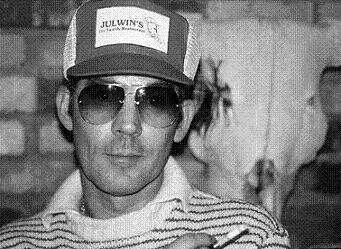
Above, Hunter S. Thompson
Hunter Thompson met Rosalie Sorrels in Sun Valley, and Rosalie later lived in David Pierce’s guest house in Point Richmond (http://www.poetspath.com/Scholarship_Project/harrell.htm):
Another Bay Area favorite of Hunter's was folk singer Rosalie Sorrels.
In 1964 the National Observer assigned Hunter to write "What Lured Hemingway to Ketchum?" He was to talk to Idaho locals who'd known Hemingway before his fatal gunshot wound at home in Ketchum in 1961; in fact, I myself (while working at Yellowstone Park) visited Hemingway's grave when flowers were still fresh.
So Hunter walked into a Ketchum-Sun Valley bar, the Leadville—converted from a bell-topped church in which Rosalie's grandfather used to preach. It was there that a grieving Kennedy family, mourning JFK, had a private New Year'sparty in 1964. The night Hunter walked in, he was to meet several lifelong friends "to be": Milli Wiggins, whom he was to call "the Style Queen of Sun Valley," was there. Michael Solheim managed the bar. (Solheim later ran Hunter's Freak Power campaign.) Rosalie was singing.
Rosalie said, "Hunter was a sap for sentimental country music. I had Mitch Greenfield as a guitar player. I sang [Utah Phillips's] 'I Think of You' ('I think of you as the night rolls by. You're on my mind the whole night through. Far away in a lonesome city'). And he asked me to sing it again. I said no, I already sang it." He bribed her with a double shot—of thirty-year-old Irish whiskey. He kept buying her the expensive whiskey and she sang it six times that night.
Rosalie and Hunter hit it off instantly: "It was like meeting someone you'd known all your life."
Like him, she hadn't finished high school. But both devoured books. In her two-story log cabin in the Idaho mountains, she has five thousand. In conversation she could throw in offbeat quotations, which Hunter liked. Their politics was similar. They "had a similar imagination—[which is] how you think things ought to be and how you know they are.
"He had good taste in sappy romantic songs.... I thought [Hunter] was shy; he used to always put his hand in front of his face so you couldn't hear what he was saying."
When she lived in David Pierce's guest house in the Bay Area and had a cult following after her first album, If I Could Be the Rain, Hunter would take people, including critics, to see her at a Berkeley folk café. Once he brought Freewheelin' Frank, a Hell's Angel, and it didn't get her fired. In fact, he was very polite. He told her, "Ma'am, you could sing the paint off the barn." Hunter wrote, "Some of Rosalie's songs are so close to the bone that I get nervous listening to them." Hunter's own version of their first meeting—from the liner notes he wrote for Travelin' Lady—is: "I think it was a night in California when I almost killed myself on a motorcycle ... I was too full of pain to sleep, so she made me a pot of tea that was half Wild Turkey, as I recall, and then she sang for me until I finally passed out around dawn."
Rosalie told another story: Years later—at Hunter's funeral—she wore a fuchsia skirt and orange shirt (or vice-versa). And a man came up to say, "I'm Johnny Depp." She said, "I know." He said, "Yes, but who are you??" When she told him, he said, "Hunter loved your music."
Hunter S. Thompson’s first major work was Hell's Angels: The Strange and Terrible Saga of the Outlaw Motorcycle Gangs, His copy editor at Random House was Margaret A. Harrell. When Random House lawyers insisted that Thompson provide verification for some of his stories by producing Hell’s Angels arrest records, he turned the job over to David Pierce (http://www.poetspath.com/Scholarship_Project/harrell.htm):
So, for the following and abovementioned reasons: 1) personal risk, 2) illegality of the attempt, 3) geographical impossibility, and 4) a spitting contempt for whatever mind that brewed the notion that I should be sent off on this hopeless chase...for these reasons and three or four more, I am turning over the whole burden of this verification question to my good friend and attorney, David Pierce of Richmond. (That sounds like a wild and vindictive statement, but it isn't... Pierce is the only person I know who can get photostats of individual police records without recourse to a subpoena.) To wit: After talking to you today I immediately called Pierce and asked how I might go about getting the Angel police records. He called the Richmond chief of police (Pierce just finished a term as Mayor of Richmond) and was told I was out of luck. At almost the same moment I was getting identical intelligence from the Attorney General's office. The cops are not about to give out police records to anybody—and especially when they're likely to be for publication.
After lengthy dealing, however, we came up with two possibilities. Pierce is handling the [Pat] Brown [gubernatorial] campaign in Contra Costa county and is thus on good terms with the Attorney General's office. I am not; they view me as a dangerous freak, mainly because of the Nation article on the Angels. Anyway, Pierce can get photostats of Angel records, with the firm understanding that we will never reveal the source, regardless of circumstances [italics added].
The second possibility involved a visit by himself to O. J. Hawkins. The attorney general's office had informed Hunter that very day that while it routinely rejected requests for individual police records, in special cases if requested in person, Deputy Director of the California Department of Justice O. J. Hawkins made exceptions.
Hunter explained: "The catch is that I have to go to Sacramento and persuade Hawkins, who apparently roams the state like a hungry chickenhawk and is seldom in his office....and the only day I can get to Sacramento is next Wednesday, Sept 21st."6
If that didn't pan out, "The illegal part [Pierce will] do for nothing, as a favor to me, and the routine searching of docket sheets he'll do for whatever it costs him"—to hire out. If Pierce did it himself, it would be $350 a day.
Next he dropped the bombshell: Pierce will "be in New York the week of October 15 and I can have him stop for lunch or a talk." Like most of his friends, Pierce had "suffered through this book from the beginning and will do almost anything to get it done."
In any case, he was "leaving Pierce in charge of all my affairs until I get back from Aspen." Even his belongings would be in Pierce's cottage. Pierce would handle "all calls, threats and press queries... He is well armed and I've been giving him pistol instruction."
So that should get us out of the hole inre verification. Pierce is far more capable of handling it than I am, and since you said you were going to pay for it anyway, we may as well have it done right ... and after Silberman queered me out of that Esquire $1000 I'd be inclined to ask $500 a day, just to get even.
Another former transient Point Richmonder who showed up at Rosalie’s birthday was Jack Thibeau who went on to have a film acting and writing career from the mid-1970s through the 1990s. A character actor, he appeared in Apocalypse Now, The Streets of San Francisco, Escape from Alcatraz and dozens of other films and TV series.
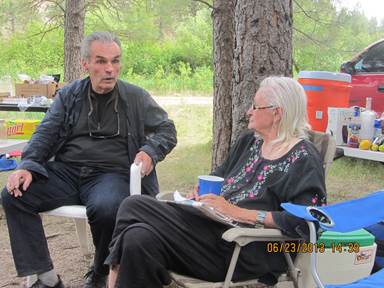
Above, Jack Thibeau with Rosalie Sorrels
Our introduction to Rosalie was from Barbara Rhodes Friday, who lived in Point Richmond for many years and recently moved with her husband Steve to Sebastopol.
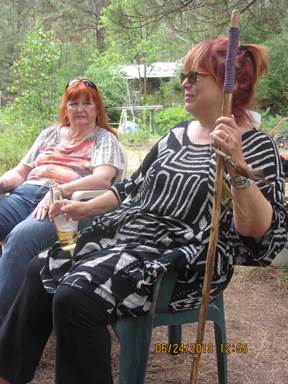
Above, Sybal Hallbauer and Barbara Rhodes Friday at Roslie Sorrel’s home
Barbara Rhodes Friday came from New Orleans and became part of the legendary Point Richmond music scene as a jazz and blues singer, moving from bartender at The Point Bar to singer in Dick Oxtot’s Golden Age Jazz Band.
A 1999 Examiner article describes a reunion of the Oxtot faithful at the Freight and Salvage in 1999 (http://www.sfgate.com/style/article/A-feast-of-traditional-jazz-3103655.php):
A feast of traditional jazz
Philip Elwood, EXAMINER MUSIC CRITIC
NORMALLY, audiences go into hibernation following the New Year's celebrations. But when there is an 80th birthday bash thrown for such a venerable mainstream jazz icon as Dick Oxtot, the trad-jazz faithful turn out en masse, as they did by the hundreds Sunday at Berkeley's Freight & Salvage.
And it wasn't just the fans who overflowed the club's space - it was all the Freight's stage could do to hold the two dozen musicians (all Oxtot alums) who gathered 'round banjoist Oxtot for the evening's grand finale, "Cake Walking Babies (From Home)," followed by his long-standing closing theme, " 'Til We Meet Again."
Oxtot, then primarily a cornetist, came on the Bay Area jazz scene in 1947, soon becoming a participant in the great traditional jazz revival sparked by the Lu Watters Yerba Buena Jazz Band along with Turk Murphy, Bob Scobey, Clancy Hayes and others.
By 1950, Oxtot had organized his Polecats, the first of a half dozen Berkeley-based groups he was to head for the next 45 years. He played with Ohio's Dixieland Rhythm Kings in the early 1950s, returning to the Bay Area for good in 1955, switching from cornet to banjo and playing with his own and other bands around Northern California for the next four decades, playing with his own Golden Age Jazz Band and for years with the strolling Swingers at A's games at the Oakland Coliseum.
Sunday's celebration was splendidly choreographed by two Oxtot alumnae from his Golden Age Jazz Band, Laurie Lewis and Barbara Higbie. Bluegrass fiddler Lewis played string bass, Higbie played piano in the Golden Age band, which played for years on weekends at The Point in Point Richmond.
Lewis and Higbie played and sang "What a Little Moonlight Can Do" at the Freight on Sunday, with Oxtot on banjo (he was on stage all night), trombonist Bob Mielke, and sax-clarinet player Jim Rothermel, among others. Barbara Dane sang "Ain't Nobody Got Blues Like Me," following with the lusty gospel number "Hold On." Oxtot sang "Louisiana" and "That Certain Party." A bit later, Barbara Rhodes, accompanied by Terry Rodriguez, piano, and the band, belted out "I Got What It Takes (But It Breaks My Heart to Give It Away)" and "New Orleans Hop Scop Blues."
Rhodes was originally the bartender at The Point, then began doubling as a singer with Oxtot's band. As Sunday's three-hour celebration swung along, various other Oxtot alums came and went - a literal musical-chairs routine. Bill Barden (whose trombone career began at S.F.'s Dawn Club in 1944) and Dick Bowman traded off with Mielke; Dick Hadlock swapped sax and clarinet chores with Rothermel; and string bassist Pete Allen occasionally gave way to tuba player Walt Yost.
Lewis' vocal on "You've Changed" (one of a number of Billie Holiday songs she and Higbie used to perform together) was one of the evening's highlights, as was a beautiful arrangement of the gorgeous "Tishomingo Blues."
Linda Wiggins, pianist-vocalist, played "Ain't Misbehavin," and returned to back Dane on "See See Rider," and Terri Garthwaite, who began the evening's vocal renditions with a wonderful version of "Truckin'," returned to lead the whole gang (every one an Oxtot alum) through a wonderfully stomping version of "Cake Walking Babies" - three trombones, two woodwinds, cornet (Earl Sheeler), a number of vocalists, two or three pianists, drummer Don Fay, a pair of banjoists (Oxtot and Randy Johnson) and others taking part.
The concert was not just a celebration of Oxtot, it was also a tribute to the Bay Area's traditional, mainstream jazz movement and its followers - the most long-suffering and faithful fans of any 20th century American music style.<
A blog by musician Jim Caroompas of Martinez describes his introduction to Barbara (http://martineztunes.wordpress.com/:
Playing the Blues with Barbara, Part I
August 14, 2009
1974 was a tough year for me – that was the year I lost my first wife. Well, I didn’t actually lose her, to paraphrase Bobcat Goldthwaite. I mean, I knew where she was. But when I looked, she was with someone else.
We were in Kodiak, Alaska, doing a six-week gig in a hotel called Beachcombers, which was an old steamship that had washed up on shore and converted to a hotel/bar/restaurant. In Kodiak, the emphasis is always on “bar.” People imbibe with fervor there. It’s really all there is to do. Well, that and hit on other people’s wives. You see, there are ten men to every woman on the island, or at least that was the ratio back then. And Jeanne, my wife, had this remarkable long blond hair that went to her ankles. It was quite beautiful, really.
We had been married for a few years by then. I was twenty in 1974, and had been the leader of my band for a couple of years. Jeanne, whom I had originally met in high school (where she had been my teacher), was the keyboard player and a singer in the band. We had a cool outfit named Colefeat, which was primarily a blues band, or at least that was our intention. Heck, in 1974 I was a kid off the hardscrabble streets of Lafayette, CA., and knew next to nothing about life experiences of the kind that launched or sustained blues lyrics. But I was playing guitar for John Lee Hooker, and learning an awful lot about that life from listening to him and his cohorts.
We played a lot of clubs in the East Bay then, including Keystone Berkeley, where we were the house band for a couple of years. We also played the Longbranch, and West Dakota, and Great American Music Hall, and Wolfgang’s, and the Point Richmond Pool Hall (about which more next week). With the exception of the Music Hall, none of those clubs remain today. But you may have heard of Eddie Money, Greg Kihn, Randy Oda, Jimmy Lyon, Tower of Power. . . those were just some of the folks getting their start back then in those same clubs.
We were not bad, given our youth and inexperience. At one point, a record company executive from ABC Records heard us, liked what he heard and invited us to spend six weeks in Kodiak, tightening up our show and preparing to record an album when we got back. That was the ticket to my dream, and I was sure from that point on that my life was going to unfold as I had always imagined it would – records, adoration, money, endless tours, interviews in Rolling Stone – you know, just the average day in a rock icon’s life.
So when we got to Kodiak, me and my band, we were pretty jazzed. What I hadn’t counted on, though, was the allure of this amazing landscape on my wife, who was eight years older than me and growing bored of being married to a kid posing as a man. She found herself a tour guide in the form of a hunky fisherman named Ed, and after the first week, I never really saw much of Jeannie. When she wasn’t singing love songs to Ed (songs I had written for her, about her, whatever), she was hanging out with him, touring the island and who knows what else.
After a couple of weeks of that, and the fact that the drummer was plotting a coup to steal my band from me after the gig was over and form his own group (which he did, by the way – google The Shakers, Yankee Reggae), I just cashed in my ticket and went home. Broke up the band, spent some very despondent weeks licking my wounds and listening to Bob Dylan’s “Blood on the Tracks.” Jeanne came home after a few weeks, and we tried patching things up, putting other bands together, but all in vain. The damage had been done, and the bad blood wasn’t going away.
Around that time (by now it was 1978), a friend of mine in the newspaper business invited me to join a bluegrass band. Not having any other musical iron in the fire, I agreed, and went to his Point Richmond home to do a little jamming. He had also invited a woman who he said sang backup vocals. She was late in arriving, but when she did, she drove up in a pink 1954 Buick, wearing a bowler hat on her massive afro, a summer dress on her 5’3” frame, which she carried quite well, and a bottle of something in her hand.
She opened her mouth to sing, and out came the voice of a blues angel. This was no background singer, I thought.
And that accounts for the next three remarkable years of my life, which I will tell you about next week. http://martineztunes.wordpress.com/
Playing the Blues with Barbara, Part II
August 19, 2009
When we left off last week, I had been cuckolded by my first wife, tried and failed at reconciliation, and was invited to Point Richmond to play in a bluegrass band, where a background singer was also invited. Her name was Barbara, and she made her entrance the way she always did – with boisterous exuberance, dominating the very air molecules and lighting up the darkest corners of wherever she was.
She auditioned a song, and I said to myself “this is no backup singer, this is a miracle of nature.” She had a quality that I had not heard before, at least live. Sure, there was a little of Janis Joplin in it, but only a hint. Barb was more like Bessie Smith; more melodic, ironic and forceful than Janis. Her voice was sweeter, but you could tell from the whiskey she poured into her songs that her life had been every bit as hard as any other blues singer’s. I was stunned, and instantly in love. It didn’t hurt that she was gorgeous, in a way that was uncommon for the end of the 1970s. She wasn’t rail thin and wispy. Rather, she had all the right curves in all the right places, and she carried herself with a confidence that radiated sexiness without the come-hither nonsense.
After she sang, I excused myself to step outside on the porch for a smoke. She followed, much to my surprise, and sat next to me. She bummed a smoke, which I lit for her, asked me my name, which I told her, then said, “wanna neck?” From that moment on, I was hers. We kissed a little on the porch, then went back inside and sang some more. Then she went home, and I didn’t so much as have her phone number. But I had an agenda.
I pretty much became a stalker from that point on. I found out where she worked (she tended bar), and I became a regular there. I found out she sang at that bar with the Dick Oxtot Golden Age Jazz Band. I became a groupie. I was around her as much as I could figure out how to be. And eventually we started going out. And she changed my life.
Before Barb, blues for me was strictly electric. No one played acoustic blues, at least no one I paid any attention to. But Barb knew all these amazing players, both living and dead, who had no band, but only their guitars. She turned me on to Ramblin’ Jack Eliot, Leon Redbone, Rosalie Sorrels, Memphis Minnie. . . many others, and she loved Leonard Cohen. So I learned to calm down, play acoustic guitar, and redirect all that crazy energy I had from jumping around and acting goofy to focusing it in emotional delivery. It happened almost overnight, and it happened because she sang with me. The two of us together just felt powerful when we sang. I don’t know how it came off – people then told us they thought we were great together, but we never really captured a show, either on tape or video. Those things were much harder to do back then. I do know that I felt a glow, a pulse, run through my veins when Barb and I sang together, and I’ve never felt anything like it since.
I took that energy and started writing serious songs, and they poured out of me. We took our show to the Gulf Coast, and played various venues there. We learned (out of necessity) lots of country classics while we were there, and added that to our blues set. It served us well.
Things didn’t last between us. Barb and I were almost too good of a couple, and we finally flamed out. But we never stopped singing together. And I never stopped cherishing her, though she doesn’t know that. She still has that amazing voice.
All this is my way of saying that this Sunday, August 23, we’re playing together again at the Hotel Mac in Point Richmond, from 5:30 to 7:30 p.m. The address is 50 Washington Avenue in Point Richmond. They serve great food, and have a very nice bar. It’s a classy place, but you don’t have to dress up.
Come by and get some late 70s nostalgia, or at least watch us get ours on. We’d love to see you.
The owner of the iconic Point Bar was Ramona Longpre, and I asked her daughter Auna what she remembered about The Point’s famous past and the characters associated with it:
Yes...mostly know the names and stories from Mom, Barb and boyfriend (an author) who spent a lot of time with Hunter. Momma loved Rosalie and helped sponsor fundraisers when she had the surgery, and in the more recent past when she needed financial help. I wasn't allowed at the bar - Mom didn't want me to become a bar fly and/or drunk. In retrospect, I'm sooo glad!! She appreciated when the Angels were hanging at her place playing pool. She said they bounced a lot of trouble makers out for her....she felt well protected and respected. Fun read, Tom...thanks for also sharing it with me. Enjoy the rest of our holiday. --A
Want to receive TOM BUTT E-FORUM and other action alerts on Richmond political and community issues delivered to your email address? Email your name and email address and/or the names and email addresses of others who would like to be placed on the mailing list and the message "subscribe" to tom.butt@intres.com. Comments, arguments and corrections are welcome. Tom Butt is a member of the Richmond City Council when opinions and views expressed, without other attribution, in TOM BUTT E-FORUM, they are those of Tom Butt and do not reflect official views or positions of the City of Richmond or the Richmond City Council unless otherwise noted. Visit the Tom Butt website for additional information about Tom Butt's activities on the Richmond City Council: http://www.tombutt.com. Phone 510/236-7435 or 510/237-2084. Subscription to this service is at the personal discretion of the recipient and may be terminated by responding with “unsubscribe.” It may take a few days to remove addresses from the distribution list.
This site may contain copyrighted material the use of which has not always been specifically authorized by the copyright owner. We are making such material available in our efforts to advance understanding of environmental, political, human rights, economic, democracy, scientific, and social justice issues, etc. We believe this constitutes a 'fair use' of any such copyrighted material as provided for in section 107 of the US Copyright Law. In accordance with Title 17 U.S.C. Section 107, the material on this site is distributed without profit to those who have expressed a prior interest in receiving the included information for research and educational purposes. For more information go to: http://www.law.cornell.edu/uscode/17/107.shtml. If you wish to use copyrighted material from this site for purposes of your own that go beyond 'fair use', you must obtain permission from the copyright owner.
To the extent that content is excerpted under the fair use doctrine from other media, I urge readers to subscribe to the print versions of these media to help support professional journalism and the businesses that publish news, and I urge readers to log in to the online versions to access additional content, related content and unrelated news. I especially appreciate local sources of news that include the Contra Costa Times , the San Francisco Chronicle, Richmond Confidential and the East Bay Express.
|
|

